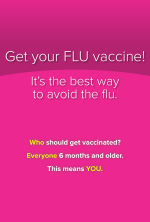You Need a Seasonal Flu Shot or the Seasonal Flu-Spray Vaccine Every Year
- "You Need a Seasonal Flu Shot or the Seasonal Flu-Spray Vaccine Every Year" is also available in Portable Document Format (PDF, 473KB, 1pg.)
Get vaccinated, especially if:
- your child is 6 months through 18 years old;
- you are pregnant;
- you or your child has a chronic (long-lasting) medical condition;
- you are older than 50; or
- you are a health care worker.
Healthy people between 2 and 49 can get the seasonal flu shot or the seasonal flu spray, a mist that's sprayed in your nose. You need to get a seasonal flu shot (not the spray) if you have a chronic medical condition or you're older than 50, you're pregnant, or you're between 6 months and 2 years old.
Remember: You cannot get the flu by getting vaccinated.
Don't get sick. Don't spread the flu.
Getting immunized will protect you from catching the flu, a serious illness that can make you very sick. It will also help protect your loved ones. If you don't get the flu, you won't risk passing this illness to them.
The flu is not just a really bad cold.
The seasonal flu is a sickness that affects the lungs, throat, nose and other parts of the body. It can spread quickly from one person to another. This very contagious respiratory illness comes on suddenly, lasts about two weeks, and can put you in the hospital. Each year in the United States, over 23,600 (and as high as about 48,000) people die from the seasonal flu.
Seasonal flu symptoms
- Fever
- Headache
- Extreme fatigue
- Sore throat
- Runny or stuffy nose
- Muscle aches
- Dry cough
- Nausea, vomiting and diarrhea (these occur more often in children)
Complications of the flu
Complications include lung, ear and sinus infections, as well as dehydration. The elderly, very young children, pregnant women and people with chronic conditions such as congestive heart failure, asthma or diabetes are at increased risk for severe flu complications or death. Some of these conditions can get much worse when a person gets the flu.
How flu spreads
The flu spreads easily from person to person. When an infected person coughs or sneezes, tiny droplets fly through the air. They then land in another person's nose, eyes or mouth. Sometimes you can get the flu by touching a surface like a table or a doorknob that has the flu virus on it, and then touching your mouth or nose.
Important: You can spread the flu to others even before you feel sick – as early as one day before you feel symptoms. You also can infect others up to five days after you become sick.
When should I get vaccinated?
The best time is early fall to December. But you can still get a seasonal flu shot or the seasonal flu-spray vaccine through March and beyond. Even though the annual flu season usually peaks in February, it continues through May. If you missed your chance to get vaccinated in the fall, talk with your health care provider. If you have a chronic (long-lasting) health condition such as diabetes or congestive heart failure, you should be among the first to get the seasonal flu shot every year.
Do I need a seasonal flu shot or the seasonal flu spray every year?
You should get vaccinated every year if you want to reduce your risk of catching the flu or spreading it to others. You should also get a yearly vaccine if you are at high risk for serious complications from the flu or you live or work with people who are at high risk.
This includes:
- Children 6 months through 18 years old
- Pregnant women
- People 50 years and older
- People with chronic (long-lasting) medical conditions such as asthma, heart disease, kidney disease, lung disease, diabetes, and metabolic or blood disorders
- People who have any condition that can weaken their breathing
- Children six months to 18 years on chronic aspirin therapy
- Residents and employees of nursing homes or long-term care facilities
- Health care staff
- Household contacts of people at high risk for complications from the flu
- Household contacts and out-of-home caregivers of children younger than six months.
Who should NOT get vaccinated?
You should not get vaccinated if you:
- are younger than 6 months;
- have a severe allergy to chicken eggs;
- have ever had severe reactions to influenza vaccines; or
- currently have a moderate or severe illness with fever.
If you have developed Guillain-Barre syndrome within 6 weeks of a previous seasonal flu shot or the seasonal flu-spray vaccine, talk to your doctor about receiving a seasonal flu vaccine.
Is it safe?
The seasonal flu vaccine is very safe. Side effects from the seasonal flu shot may include pain at the injection site (where you received your shot). The seasonal flu spray may give you a sore throat, runny nose, and fatigue. Remember, you cannot get the flu by getting vaccinated.
Get a seasonal flu shot. Or the seasonal flu-spray vaccine. If you have questions, talk with your health care provider.
For more information, email us at: immunize@health.state.ny.us or visit: www.health.ny.gov
